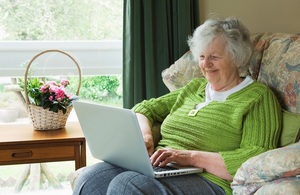4D tech to prevent falls to be rolled out in social care settings
4D mapping technology that detects falls using sensors and alerts carers is piloted in care homes.

- Funding for wider roll-out of technology to support hundreds of vulnerable people and reduce pressure on the NHS.
- Technologies with potential to improve support and help people live more independently also include robotic pets and digital voice coaches.
4D imaging technology which can prevent falls and automatically alert carers to a medical issue could soon be rolled out in more care homes across England.
Whzan Guardian, a UK-developed technology, is a monitoring system that uses 4D mapping technology to track people’s movement around the house and detect falls through sensors placed around the home.
Pilots in several care homes across England resulted in a 66% reduction in falls and around a 97.5% reduction in ambulances called or required post fall, reducing pressure on the NHS and protecting vulnerable residents.
The technology will now be rolled out in Redbridge Integrated Care System (ICS) for further testing after North East London Integrated Care Board (ICB) received a £1 million funding boost from the government as part of the Adult Social Care Technology Fund.
If successful, it could be rolled out to more care homes nationally.
Minister for Social Care, Helen Whately, said:
Older and more vulnerable people are at a significant risk of falls. Technology plays a crucial role in preventing them, avoiding ambulance callouts and hospital admissions and reducing pressure on the NHS.
The Care Tech Fund has identified technology with major potential to improve the quality of care while helping people live safely and independently. The technology will deliver savings for taxpayers, as falls cost the NHS around £2 billion every year.
Scaling up this technology is a vital part of our 10-year vision for social care reform. As the care needs of our population grow, technology will play an increasingly important part in social care that gives people the independence, freedom and security they deserve.
The Adult Social Care Technology Fund was launched in April 2023 as part of the Digitising Social Care programme. The fund seeks to identify promising technology that has the potential for wider roll-out within the care sector.
The programme, which is jointly delivered by the Department of Health and Social Care and NHS England, invited ICSs, care providers, local authorities and technology suppliers to submit expressions of interest to apply for funding to roll out technology.
Three other successful projects have also been announced today.
Lancashire and South Cumbria ICB will receive £1.2 million to develop a medication management system which will monitor dispensing activity of tablet and liquid treatments in real time. This will improve patient safety and support up to 2,500 people.
Bedfordshire, Luton and Milton Keynes ICB will receive £1.1 million to develop pain assessment tools and robotic pets to support adults experiencing communication difficulties, as well as adults with dementia, low mood, anxiety, cognitive impairment and problems that make it difficult to live independently.
These technologies will help reduce avoidable admissions or readmissions to hospital and improve the quality and safety of care. This will support over 9,250 people in domiciliary care and in care homes.
The London Borough of Barking and Dagenham will receive £1.1 million to roll out a range of digital technologies to older people. These include video and communication devices, smart home tech and sensors for fall detection.
This will support 300 people in domiciliary care and measure the impact that personalised digital care can have on people, care provider efficiency and the wider health and care system.
Redbridge Place based Partnership has also identified 2 other technologies with the potential for roll-out:
- the Miicare Cube is a digital health coach that has been designed by older adults, empowering those with care needs to self-care at home by voice using conversational artificial intelligence (AI)
- Informetis technology combines a smart sensor with AI to monitor home appliances and overall power consumption to map out routines and activities of the user. Once mapped, the sensor will recognise any deviation from normal routines, potentially identifying when there has been an incident to alert carers
Background information
The Digitising Social Care programme has also been supporting the scaling of Digital Social Care Records (DSCR) across England and has recently confirmed that funding and support will continue into 2024 to 2025.
Areas that are on track to meet targets for DSCR adoption will be encouraged to scale other proven technologies. A toolkit to support the implementation of falls prevention and detection technologies will be published later this year.
4D technology
The Whzan Guardian activity monitoring system was developed with City of Sunderland to extend care to vulnerable people in their own homes showing signs of frailty and often early-stage dementia.
The Whzan Guardian is a collection of discreet wireless sensors that are placed on the wall - monitoring behaviour and environment according to need. The system comprises a selection of low-cost sensors connected to wifi.
Evidence of effectiveness is contained within studies and evaluations from UCL Partners, North Central London ICB, Leicester and Rutland NHS, Mid and South Essex ICB, City of Sunderland Council.
The Vayyar technology that would be deployed alongside the Guardian Kit from Whzan has been installed across 2 ICB areas in and has been reviewed over 8-month pilots.
The system saved the local authorities and NHS in each area £29,945 and £272,850 respectively.